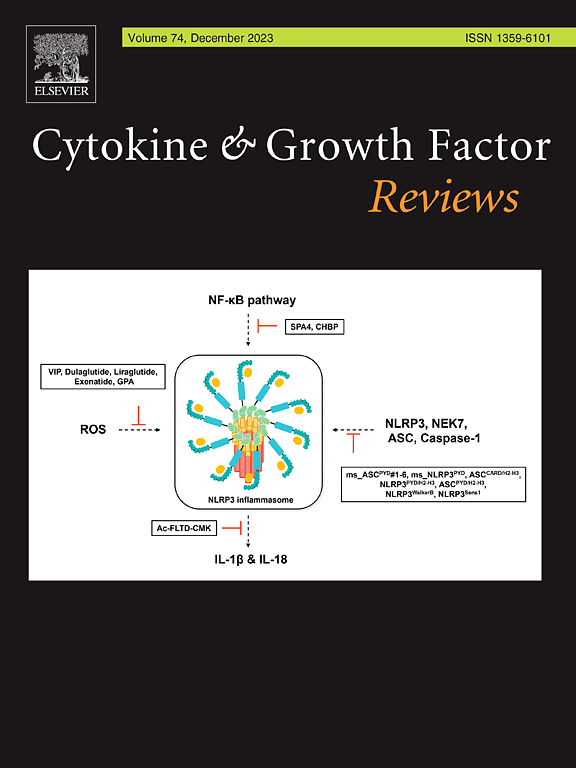慢性压力对结直肠癌进展过程中肠粘膜免疫的影响
IF 11.8
2区 医学
Q1 BIOCHEMISTRY & MOLECULAR BIOLOGY
引用次数: 0
摘要
慢性压力是导致结直肠癌(CRC)恶化的一个重要风险因素,在最近的研究中引起了广泛关注。它通过 "脑-肠 "轴影响肠粘膜内免疫细胞的分布和功能,改变细胞因子和趋化因子的分泌,并形成免疫抑制性肿瘤微环境。肠道常被称为 "第二大脑",特别容易受到慢性压力的影响。肠粘膜免疫中的细胞因子和趋化因子(IMI)在慢性压力下,细胞因子和趋化因子与 CRC 细胞的增殖、转移和耐药性密切相关。最近,抗抑郁药成为治疗 CRC 的潜在药物,可能是通过调节 IMI 来恢复体内平衡并发挥抗肿瘤作用。本文回顾了慢性应激通过影响肠粘膜免疫促进 CRC 进展的作用,探讨了慢性应激下肠粘膜的潜在靶点,并提出了治疗 CRC 的新方法。本文章由计算机程序翻译,如有差异,请以英文原文为准。
Impact of chronic stress on intestinal mucosal immunity in colorectal cancer progression
Chronic stress is a significant risk factor that contributes to the progression of colorectal cancer (CRC) and has garnered considerable attention in recent research. It influences the distribution and function of immune cells within the intestinal mucosa through the "brain-gut" axis, altering cytokine and chemokine secretion and creating an immunosuppressive tumor microenvironment. The intestine, often called the "second brain," is particularly susceptible to the effects of chronic stress. Cytokines and chemokines in intestinal mucosal immunity(IMI) are closely linked to CRC cells' proliferation, metastasis, and drug resistance under chronic stress. Recently, antidepressants have emerged as potential therapeutic agents for CRC, possibly by modulating IMI to restore homeostasis and exert anti-tumor effects. This article reviews the role of chronic stress in promoting CRC progression via its impact on intestinal mucosal immunity, explores potential targets within the intestinal mucosa under chronic stress, and proposes new approaches for CRC treatment.
求助全文
通过发布文献求助,成功后即可免费获取论文全文。
去求助
来源期刊

Cytokine & Growth Factor Reviews
生物-生化与分子生物学
CiteScore
21.10
自引率
1.50%
发文量
61
审稿时长
22 days
期刊介绍:
Cytokine & Growth Factor Reviews is a leading publication that focuses on the dynamic fields of growth factor and cytokine research. Our journal offers a platform for authors to disseminate thought-provoking articles such as critical reviews, state-of-the-art reviews, letters to the editor, and meeting reviews.
We aim to cover important breakthroughs in these rapidly evolving areas, providing valuable insights into the multidisciplinary significance of cytokines and growth factors. Our journal spans various domains including signal transduction, cell growth and differentiation, embryonic development, immunology, tumorigenesis, and clinical medicine.
By publishing cutting-edge research and analysis, we aim to influence the way researchers and experts perceive and understand growth factors and cytokines. We encourage novel expressions of ideas and innovative approaches to organizing content, fostering a stimulating environment for knowledge exchange and scientific advancement.
 求助内容:
求助内容: 应助结果提醒方式:
应助结果提醒方式:


